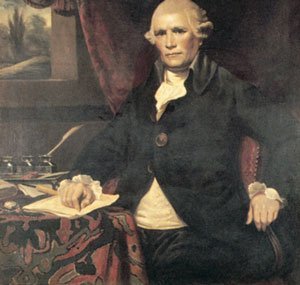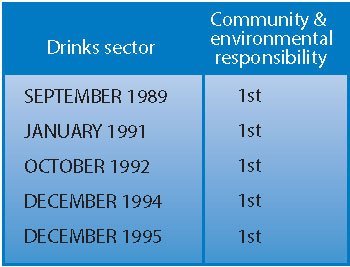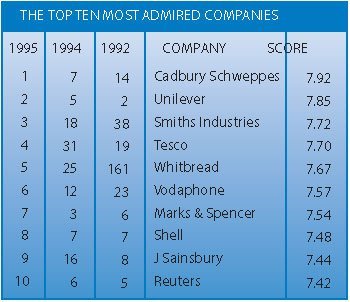
All organisations operate within a wider environment in which they need to carefully build up and to sustain long-term relationships. In recent times it has become fashionable to talk about business organisations needing to serve their stakeholders who are shareholders, employees, suppliers, customers and the communities in which they operate. It is equally clear that business organisations are major stakeholders in the community. We can represent this as a two way commitment.
There are a number of ways in which business organisations’ stakeholding in the community should operate:
- CREATING PROSPERITY – A prosperous company helps to create a prosperous community. This happens in a number of ways. The company creates jobs. These jobs should involve fair payment for work done, safe working conditions and prospects for the future and a commitment to the personal development of the people within the organisation. Additionally, the company will provide goods and services which meet the needs of consumers. The goods it creates will enhance the lifestyles of citizens and the products will be made with due concern for the environment and for future generations. A successful business will create prosperity in the community – a prosperous community will create successful business.
- HELPING OTHERS – A successful company will help the community in a variety of ways. It will provide jobs. It will pay taxes which support the infrastructure of the economy and help to provide benefits for the needy. In addition, it will run its own projects which are targeted at particular community benefits, such as an education service, supporting the voluntary sector and local enterprise etc. It will also support other businesses by for example, settling accounts promptly and by fair dealing.
- ENCOURAGING EMPLOYEES TO DEVELOP THEMSELVES WITHIN THE WIDER COMMUNITY – An enlightened organisation will realise that its greatest assets are its people and that they can make an important contribution to the community. By being involved in community projects, individuals will develop their portfolio of skills and abilities. They will find the work rewarding and this will lead to increased motivation. Moreover, they will be proud to work for their company and be proud of its achievements.
This case study focuses on one business organisation – Whitbread and shows how, through its commitment to the community, it has been able to develop a high reputation for quality and excellence in all that it does.
Background to Whitbread

Whitbread has developed considerably since it was founded by Samuel Whitbread in 1742. A Farmer’s son, the original founder had completed an apprenticeship in the Brewer’s Company in the City of London before going into partnership with Thomas Shewell to make beer in the north of the City of London.
Whitbread is one of the few companies dating back to the mid-eighteenth century which has not only remained independent, but has established itself as one of the top 100 companies in the United Kingdom. Today, Whitbread is a major food, drinks and leisure company with net assets and annual sales of some £2 billion and over 70,000 employees. The company has developed from its origins in brewing, to owning and operating some of the country’s most popular public houses, restaurants, shops and hotels, whilst still retaining its reputation for high quality brands of beer.
Whitbread manages an impressive portfolio of quality brand names ranging from leisure companies such as David Lloyd Leisure, through pubs and restaurants such as Beefeater, T.G.I. Friday’s, Brewers Fayre and Pizza Hut, through to the Marriott Hotel Group, Travel Inn, Thresher and beers such as Heineken, Stella Artois, Murphy’s Irish Stout and Boddingtons. Quality products and exceptional service have been at the heart of the business since Samuel Whitbread first began brewing over 250 years ago. They are just as important today.
Objectives
It is always important to look at an organisation’s strategic objectives because they determine its total philosophy. Whitbread’s strategic objectives are:
- to be the pre-eminent retailer in drinks and eating-out in the UK;
- to develop a strong, profitable, brands-oriented beer business;
- to reduce continually its cost of doing business;
- to provide customer service better than that of competitors;
- to manage the cash flow as though it were its own, and
- to strengthen the organisation’s distinctive culture through collaboration, shared values and effective communication.
These objectives then become the driving force for the way its four operating divisions run. These four divisions are:
- Whitbread Inns i.e. pubs and pub restaurants
- Whitbread Restaurants and Leisure
- Whitbread Beer Company i.e. an integrated beer manufacturing, distribution, sales and marketing operation
- Whitbread Pub Partnerships i.e. Leased Pubs.
Local communities
Whitbread has long been involved with the local communities in which it operates and is recognised as one of the corporate leaders in this field. Whitbread sees this commitment as being a better way of carrying out business and as a better way of making an important contribution to a thriving community. Whitbread regards the large sums of money spent on community activities as a genuine investment in the future of the business. Whitbread’s Community Investment Programme (CIP) is carefully thought out and is based on a number of key objectives. These are:
- To improve the economic health of local communities in order that Whitbread businesses enjoy enhanced trading over the longer term;
- To enhance Whitbread’s image as a responsible and enlightened company with staff, media, shareholders, consumers, opinion formers and government;
- To provide personal development and motivational opportunities for Whitbread staff;
- To act as an exemplar of good CIP practice in order that other organisations pursue CIP policies which are likely to improve the general trading environment.

In order to make the strategy work, it has to have the support of the senior decision makers within an organisation. With this in mind, Whitbread has developed a “Seeing is Believing” programme for Senior Managers. Under this scheme all Senior Managers spend one day visiting community projects, which enables them to champion, encourage and help establish the credibility of the community programme. By creating the commitment necessary to this strategic initiative it then becomes possible to institute this commitment at all levels within the organisation.
Whitbread was amongst the earliest U.K. companies to establish a dedicated community programme in 1981. Reporting directly to the Chief Executive, the programme has a national strategy but is operated through a locally based structure, reflecting the nature of its’ various businesses. Whitbread’s Community Investment Programme utilises all of the different types of resources within the company, people, money, materials and equipment. An example of this is the Luton Foyer project, which is a hostel and training centre for young homeless people. It has received financial support, furniture for 49 bedrooms, training facilities, office equipment, volunteer advice and offers of job opportunities.
Investment
There are three main strands of the Community Investment Programme. These are:
- Business Education Partnerships
- Volunteering and support for the voluntary sector
- Local social and economic regeneration
Business Education Partnerships – In 1991, the company established the Whitbread Education Team, which consists of a national manager, responsible for the overall management and direction of the programme and five regional managers, who facilitate activity between Whitbread employees and educational establishments.
Recognising the importance of support for education, a campaign entitled “Brighter Futures” was launched to inspire even more Whitbread employees to become involved with schools, colleges and universities. The main activities of the programme are the provision of work experience for young people (over 1,000 young people benefit from work experience with Whitbread each year), the development of teachers through teacher placements with Whitbread (over 350 teachers per annum benefit through teacher placement in a real business environment and share some of Whitbread’s management techniques), providing business projects for pupils in line with the National Curriculum and the representation of Whitbread employees on appropriate education bodies such as Boards of Governors. An examples of a Brighter Futures project:
- A Beefeater manager who arranged a project involving her local primary school. 30 pupils took part and were asked to design and draw up their favourite non-alcoholic cocktails! Their work was displayed in the restaurant, and parents and relatives came along to sample the final products.
Volunteering and support for the voluntary sector – Whitbread sees employee volunteering as a fundamental part of its Community Investment Programme and ensures employees who take part receive the support and recognition they deserve from top level management. Pioneered in the U.K. by Whitbread in conjunction with Business In The Community, and resourced by an Employee Volunteering Manager, Whitbread now has 30 volunteering committees, providing their experience and skills to the voluntary sector. These activities can involve anything from clearing a river bank, decorating a new hospice wing, raising money for charity or organising a sports day for the disabled. Individual volunteering is also recognised by grants from the company to the organisations supported, through the Whitbread Awards for Volunteer Effort (WAVE).
Local social and economic regeneration – One of the major concerns of CIP is the “health” of local communities. A community’s health can be measured environmentally, socially or economically and Whitbread plays an influential role through involvement with organisations such as Enterprise Agencies, Business Links and Local Partnerships. Whitbread’s local community network, administered by nine Regional Community Affairs Directors, has discretion to respond to local issues such as crime prevention, homelessness, facilities for the disabled, unemployment and youth exclusion. Links between our local businesses and other groups help provide solutions.
Whitbread currently supports 22 Enterprise Agencies across the UK through the provision of both core funding and human resources. Whitbread recognises the vital role the voluntary sector contributes to societies’ well being. It donates significant sums through the Whitbread Charitable Trust as well as other forms of support, including management time and expertise.
Benefits to Whitbread
In assessing Whitbread’s community programmes it is essential to look at the benefits that flow back to the company from such involvement. It is important to bear in mind that every well managed company needs to give priority to its bottom line. After all, it is only by making a sustained long-term profit over a period of time that the company is able to guarantee a good return to shareholders, secure employment opportunities for existing employees, pay an increasing share of taxation, provide quality goods and make key contributions to the community.
The benefits to Whitbread of its CIP can be shown by focusing in particular on one of its programmes i.e. the Whitbread Education Partnership. For Whitbread employees, there are important benefits to be gained from being involved in the Partnership. Individual development and opportunities to improve personal skills are enhanced by participating in community activities. For example, by giving a presentation to a group of school or college students, employees can build their self-confidence and presentation skills, whilst at the same time demonstrating a commitment to the CIP. In addition, being involved in the Partnership improves team building through community programmes where individuals have to work in groups, in order to ensure that projects are concluded satisfactorily.
Other benefits in the areas of marketing, market research and development arise as a result of young people giving their views. For example, recently 8-14 year olds were encouraged, as part of a national competition to create a Beefeater Restaurant Menu for junior diners. Partnership activities also make it possible to enhance the public image of the company and provide substantial public relations opportunities. As in any other organisation involved in such activities, Whitbread maximises the public relations from all activities by using the local and regional press, radio and television, leading to an increased product awareness of Whitbread brands and activities.
Conclusion

All business organisations in the UK today aspire to being regarded as one of Britain’s most admired companies. Whitbread has been able to achieve this position as a result of a very carefully thought out strategic focus – i.e. making sure that the company concentrates on its best lines, creates an excellent public image, satisfies consumers, employees and other stakeholders, and makes an important and high profile contribution to the community.
The Most Admired Company survey sponsored by the well established and highly rated Management Today magazine, evaluates corporate reputation through performance in nine key characteristics:
- Quality of management
- Financial soundness
- Ability to attract, develop and retain top talent
- Quality of products and services
- Value as a long term investment
- Capacity to innovate
- Quality of marketing
- Community and environmental responsibility
- Use of corporate assets
In the 1995 survey Whitbread came first in the drinks sector of the market place. In terms of its community and environmental responsibility this was the pleasing result of many years of successful achievement. For the first time in 1995, Whitbread appeared in the top ten of most admired companies nationally, after making spectacular progress from being only 161st in 1992.

It is clear from the table that some organisations like Cadbury Schweppes and Whitbread have made giant leaps forward in recent years. In the drinks sector, Whitbread has certainly been the key performer. Importantly, Whitbread is also the company in this sector which has made by far the biggest contribution to community programmes with a spend of over £2 million on community investment programme in 1996. However, it is not just the quantity of resources that are committed to these programmes which is important. Equally important is the quality and quality stems from having clear objectives, focus and commitment throughout the organisation. This case study has shown how Whitbread has put all of these ingredients into effect in creating a clear and well organised strategy, based on giving a top priority to the community. But of course this is nothing new, Whitbread has always been committed to the communities in which it operates. What is different today, is the extent of this commitment and the enthusiasm to make it work.
